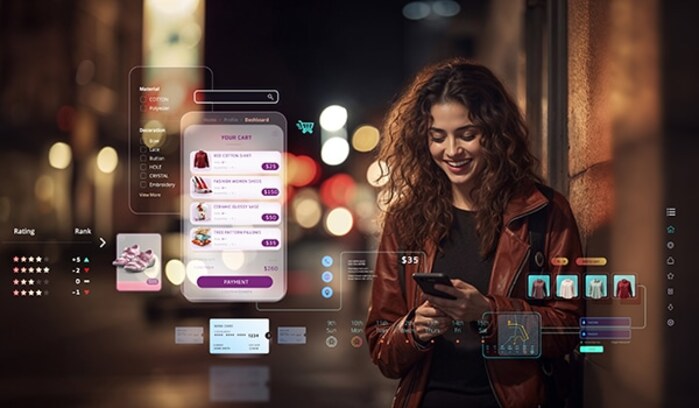AI-Driven Personalization: Transforming E-Commerce
AI-driven personalization is reshaping the e-commerce landscape by offering tailored experiences that meet individual customer needs. In this blog post, we’ll delve into how artificial intelligence is revolutionizing online shopping, from product recommendations to dynamic content, and explore the innovative ways businesses can harness this technology to stay ahead of the competition and enhance customer loyalty.
1. Hyper-Personalized Customer Experience: The Age of Knowing Your Customer
AI allows businesses to create hyper-personalized customer experiences by leveraging vast amounts of real-time data. From product recommendations to personalized promotions, brands can use AI to deliver unique experiences that resonate with each shopper. This level of customization deepens emotional connections with customers, fostering loyalty and encouraging repeat purchases.
How Does It Work?
AI-powered algorithms analyze customer data such as browsing history, purchase behavior, and demographic information to create detailed customer profiles. Brands like Amazon generate a significant portion of their revenue—up to 35%—by providing personalized recommendations tailored to each user’s preferences.
2. AI-Driven Product Recommendations: Boosting Cross-Sell and Upsell Opportunities
One of the most impactful applications of AI in e-commerce is product recommendations. By showing customers products they’re likely to be interested in, businesses can significantly increase average order value (AOV) and boost cross-selling opportunities.
How Does It Work?
AI models such as collaborative filtering and content-based filtering analyze user data to suggest products. While collaborative filtering looks at what similar users have bought, content-based filtering focuses on the attributes of products a customer has already engaged with. Companies like Netflix and Spotify use AI to power their recommendation systems, boosting user engagement.
3. Dynamic Pricing: Real-Time Adjustments for Maximum Profitability
AI enables e-commerce platforms to implement dynamic pricing strategies that adjust in real-time based on various factors such as customer demand, competitor pricing, and individual user behavior. This approach helps businesses maximize profitability by offering personalized discounts or pricing that reflects market conditions.
How Does It Work?
By analyzing data such as inventory levels, customer purchase history, and competitor prices, AI can dynamically adjust product pricing to drive conversions while optimizing profit margins. Amazon is a prime example of a retailer leveraging dynamic pricing to stay competitive.
4. AI-Enhanced Customer Segmentation: Precision Marketing at Its Best

Traditional customer segmentation is no longer enough to meet modern consumers’ needs. AI takes segmentation to the next level by using data-driven algorithms to create granular customer segments based on behavior and preferences. This leads to more precise targeting and more effective marketing campaigns.
How Does It Work?
AI algorithms group customers based on factors like shopping habits, purchase frequency, and engagement, allowing businesses to target their audiences with personalized messages.
5. AI-Powered Chatbots and Virtual Assistants: 24/7 Personalized Support
AI-powered chatbots and virtual shopping assistants offer real-time, personalized customer support that enhances the overall shopping experience. From answering product questions to offering tailored product suggestions, these tools make customer service more efficient and interactive.
How Does It Work?
Using natural language processing (NLP) and machine learning, AI-powered chatbots can respond to customer inquiries in real-time, continuously learning from interactions to improve their responses. Sephora and H&M are leveraging chatbots to provide personalized shopping recommendations.
6. Visual Search and Augmented Reality (AR): Bringing the Future to Shopping
AI-powered visual search tools and augmented reality (AR) are transforming the way customers find and try products. Visual search allows customers to upload images to find similar products, while AR lets users virtually try on clothing or visualize how items like furniture would look in their homes.
How Does It Work?
AI uses deep learning and computer vision to analyze uploaded images and match them to similar products. AR, powered by AI, creates virtual simulations that enable users to “try before they buy.” IKEA’s AR app is a great example of how technology can enhance the shopping experience. Explore more about AR in e-commerce.
7. Customer Retention and Churn Prediction: Keeping Your Best Customers
It’s well-known that acquiring new customers costs significantly more than retaining existing ones. AI can help businesses predict customer churn by analyzing engagement levels, shopping frequency, and other behavioral data. This allows companies to act before it’s too late, offering personalized discounts or messages to retain at-risk customers.
How Does It Work?
AI models track and predict customer behavior, providing insights into which customers are likely to churn. Brands like Spotify use AI to detect potential churn and target those customers with personalized offers.
8. Content Personalization and SEO Optimization: Delivering the Right Message

AI-powered tools also play a major role in content personalization and SEO optimization. Websites can dynamically adjust content based on each visitor’s preferences and browsing behavior, providing a highly relevant shopping experience. In addition, AI tools analyze user search intent to ensure content is SEO-friendly and visible in search results.
How Does It Work?
AI systems use data to deliver personalized content on websites and emails, while also helping to optimize landing pages for search engines. Shopify and Magento are leading the way with AI-powered personalization features.
9. Supply Chain and Inventory Management: AI Behind the Scenes
AI-driven supply chain and inventory management systems help e-commerce brands predict demand and optimize stock levels, ensuring products are available when customers need them. This leads to improved customer satisfaction and more efficient business operations.
How Does It Work?
AI-powered predictive analytics helps businesses forecast demand and adjust inventory accordingly. Zara uses AI to predict trends and ensure the right products are available at the right time.
The Key Benefits of AI-Driven Personalization
- Increased Conversion Rates: Personalized experiences turn browsers into buyers.
- Improved Customer Loyalty: AI helps create meaningful interactions that drive repeat purchases.
- Operational Efficiency: AI automates key processes like pricing and inventory management.
- Data Utilization: AI enables businesses to make the most of customer data for more effective marketing.
Conclusion
AI-driven personalization is revolutionizing e-commerce by allowing businesses to deliver customized experiences that resonate with individual customers. From hyper-personalized product recommendations to dynamic pricing, AI offers powerful tools to engage customers, increase sales, and streamline operations.
Brands that invest in AI-driven personalization will not only enhance customer satisfaction but also gain a competitive edge in an increasingly digital marketplace.
Boost Your E-Commerce with Frontlevels
Looking to automate and scale your e-commerce operations? At Frontlevels, we specialize in Magento and Shopify development, helping businesses integrate the right automation tools to drive efficiency and growth.
Get in touch today to discuss how we can help you streamline your operations and boost your sales!


9 thoughts on “AI Personalization: Revolutionizing E-Commerce”